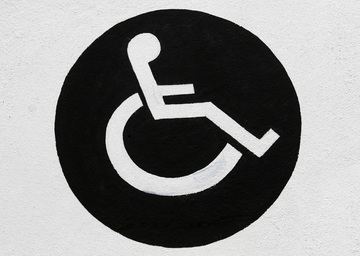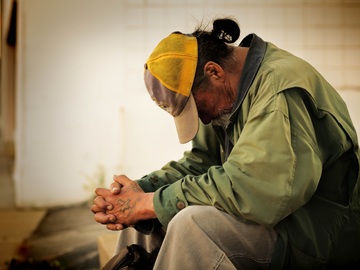
December 3rd was International Day of Disabled Persons. Today people with disabilities are considered to be integrated and equal in our western society. But does this picture correspond to the real world? 23,500 people in Austria work in workplaces for the disabled, where they only receive monthly pocket money of 60 to 150 euros for their daily services. We believe that this is anything but equal.
NO WAGES OR SALARY FOR DIABLED WORKERS
23,500 physically and mentally handicapped people work in workplaces for the disabled in Austria, which are also called day facilities or day structures. This might sound great, after all, despite their physical and mental limitations, they have a meaningful occupation there. However, a workplace for the disabled is a “therapeutic measure” and not a real job. These jobs are therefore not considered to be regular employment, despite the disabled people doing valuable work there. Anyone who ends up in a therapeutic measure was previously classified as “unable to work” and thus unable to participate in the regular labour market. There is no longer any chance for this person of a job in the public service or in the private sector. This is the fate of about half of the people in Austria who have a mental or physical impairment. The work in the workshops is not compensated in the form of a salary, but pocket money, which, depending on the federal state, amounts to between 60 and 150 Euros per month. In addition, it does not provide any social, health or pension insurance, which means that co-insurance with a parent or other relatives is necessary.
DIAGNOSIS: UNFIT FOR WORK

Many disabled people are labelled “unable to work” at an early stage, which means that it is difficult to enter the regular labour market. From this point employment in a special workplace or therapeutic measure is the only option. The decision as to whether or not someone is fit for work is based on purely medical criteria. Those who are able to work are those who are found to have a productive capacity of more than 50% of ‘normal’ levels. Whether the person has a desire to work or how much support comes from those around them is not taken into account. Once the incapacity for work is “diagnosed”, it is seldom removed.
DANGER OF POVERTY IN OLD AGE
Employment in workplaces for the disabled can really come back to haunt people, especially in old age, as no contributions were made to a pension fund during the many years in which one was actually employed. If relatives do not take precautions before their death, those affected face poverty in old age. Those affected work in unpaid settings for most of their lives and at some point they are released into retirement. From that point on nobody feels responsible for them anymore. Representatives of the disabled are therefore calling for disabled people not to be treated like children in the future, but to be able to receive a pension themselves like non-disabled adults.
HOW MUCH IS WORK WORTH?
In the therapeutic measure workplaces, goods are produced and services are provided that are of great benefit to society. Lebenshilfe Wien has a total of six of these workplaces with a variety of work options. To name just a few examples: Everyday objects and works of art are made from wood, ceramics and paper, sewing and embroidery are donet, events are catered and custom contracts such as mailing, sorting and organising documents are completed for companies. There is also the so-called mobile group, which helps private customers or companies relocate or clear out the clutter or assemble prefabricated furniture. Depending on their interests and strengths, the “patients” of the workplaces take on a variety of tasks.
CAPITALISM IS LOCKING OUT THE DIABLED
We live in a capitalist system that only recognizes traditional gainful employment as work. The more productive and efficient, the more an activity is worth. The human being falls by the wayside. People with disabilities are not wanted on the labour market of our society because they often cannot achieve the same performance within the same amount of time as others – and because the resources they need do not want to be made available (e.g. assistance or support). If we allow disabled people to work in workplaces without proper pay, it is implied that they are not of equal use to our society, and therefore of less value. Incidentally, this also applies to women: They do many hours of non-remunerated work, such as caring for old and sick relatives, childcare and household chores. The state should also value and appreciate these forms of work. As long as that doesn’t happen, we are unfortunately still a long way from an equal society.
A BREACH OF THE CONVENTION FOR THE PROTECTION OF DISABLED PERSONS
The UN Convention on the Rights of Persons with Disabilities states that every country must create a labour market that enables “all people with disabilities to earn a living, social security and pension from an adequate income”. According to Lebenshilfe, the current work and employment opportunities in Austria do not meet this standard.
WAGES RATHER THAN POCKET MONEY

With its campaign “Salary not pocket money!” Lebenshilfe Austria has been drawing attention to this issue since 2019 and calling for fair pay – but not only this: The therapeutic measure should not be abolished, but the transition between it and the regular labour market should be made easier . In order to integrate disabled people into the labour market, companies should be given more incentives, for example in the form of higher wage subsidies. In addition, the 50 percent “mark” of work (in)ability should be abolished. This limit is arbitrary and ineffective – every person is valuable in their own way and can contribute something good to society. People who work in workplaces for the disabled should also have pensions and social security like regular employees.
END THE SYSTEM OF “CARE” AND INEQUALITY
In Germany there are also many disabled people in special workplaces. According to Zeit Online, only 30 percent of all people with disabilities in Germany are integrated into the regular labour market. Forty-year-old German André Thiel, who has a disability himself and has campaigned for the inclusion of disabled people into the world of work for many years, explains: “The special workplace system has nothing to do with rehabilitation or participation in working life. Ultimately, the point is that these groups of people are cared for during the day ”. Being trapped in this system himself, he knows how unfair it is. He even filed a lawsuit against his workplace, in which he aimed to secure equal pay for employees with disabilities and make it equal to that of the employees of the facility that did not have disabilities. In his opinion, everyone should have the same rights and responsibilities in the workplace. He says that those who are disabled do not need a carer in the workplace, but an assistant – but in this case it seems making money is more important than people.
